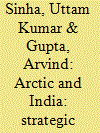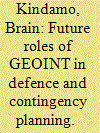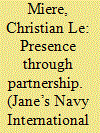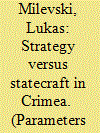|
|
|
Sort Order |
|
|
|
Items / Page
|
|
|
|
|
|
|
| Srl | Item |
| 1 |
ID:
135045


|
|
|
|
|
| Summary/Abstract |
A global temperature rise is being experienced earliest and most intensely in the Arctic region. The changes are worrying but the commercial interests are equally enticing. The Arctic is witnessing the convergence of the geophysical, the geo-economic and the geostrategic in strange and dramatic ways, making it a paradox and an antithesis. For India, the Arctic is distant when it comes to economic interests and near when it comes to climate change. As India today reassesses and rethinks its role in the new global geopolitical space, the Arctic becomes an important part of that reorientation and a movement towards a ‘global knowledge commons’. The Arctic is now an important geographical categorisation in India’s global policies. It must also be stressed that recent Arctic ascendancy in the policy domain stems directly from the strengthening of India’s climate change-linked economic and scientific positions in global world affairs.
|
|
|
|
|
|
|
|
|
|
|
|
|
|
|
|
| 2 |
ID:
135050


|
|
|
|
|
| Summary/Abstract |
For nearly a quarter of the past century a series of notable changes have taken place in the Arctic. All of them, whether political, economical, environmental or climate-related, inevitably had an impact on regional and global governance. This commentary mainly focuses on the role of China in Arctic affairs in the context of global change and global governance.
|
|
|
|
|
|
|
|
|
|
|
|
|
|
|
|
| 3 |
ID:
136655


|
|
|
|
|
| Summary/Abstract |
Nepal shares an open border of 1,868 km with five Indian states (Uttarakhand, Uttar Pradesh, Bihar, West Bengal and Sikkim) and 1,415 km with Tibet. Under the 1950 Treaty of Peace and Friendship with India, Nepali citizens enjoy ‘national’ treatment and Nepali businesses unhindered rights of trade, transit and movement. An estimated six million Nepalese live and work in India and contribute to their inward remittances. Social intercourse along the Gangetic plane is described by people as ‘roti-beti ka sambandh’ (a RELATIONSHIP based on sharing of hearth and marriage). Predominantly a land of believers of Hinduism and Buddhism, Nepal shares a long and enduring cultural history with India. The Hindus of India hold Pashupatinath in high esteem and those of Nepal the Char Dham of India (the four important abodes of the Hindu pantheon in India, namely Jagannath Puri, Dwarka, Rameswaram and Badrinath). Lumbini and Bodhgaya join the common ethos of Buddha’s life and teachings. About 40,000 Gurkha soldiers serve in the Indian army today.
|
|
|
|
|
|
|
|
|
|
|
|
|
|
|
|
| 4 |
ID:
136406


|
|
|
|
|
| Summary/Abstract |
The article focuses on the role of Geospatial intelligence (GEOINT) in defence and risk management by analyzing imagery, and geospatial information related to geographically referenced activities on the Earth. It mentions the phases of intelligence process in GEOINT operations including planning and direction, imagery exploitation and dissemination, and the GEOINT agencies working in different countries such as Defence Intelligence Joint Environment (DIJE) in Great Britain for the same.
|
|
|
|
|
|
|
|
|
|
|
|
|
|
|
|
| 5 |
ID:
136357


|
|
|
|
|
| Summary/Abstract |
With one-fifth of the world population, China see no reason why it would not be interested in Arctic affairs. Matthew Willis considers China’s strategic approach to the region and examine how its overtures are being received.
|
|
|
|
|
|
|
|
|
|
|
|
|
|
|
|
| 6 |
ID:
135337


|
|
|
|
|
| Summary/Abstract |
Alexander Dugin, the well-known public philosopher, entered Russia's intellectual and political life in the 1990s, with strongly anti-American and often anti-Western statements. Dugin's philosophy, especially in its early version, was of great use for foreign analysts with its emphasis on the irreconcilable conflict between the Eurasian civilization – with Russia in its centre – and the Atlanticist civilization led by the United States. While the image of Atlanticism and Americanism as despiritualizing forces ready for global predominance emerged in Dugin's work early on, it was later supplemented by another image, stressing Atlanticism as a desire to play God, to change the nature and the man himself. Consequently, Atlanticism and Americanism cannot live in peace until the Eurasian civilization is destroyed completely. While geopolitical Duginism of the 1990s had few direct translations into actual Russian foreign policy, it had an indirect relationship to Putin's posture in Crimea and Ukraine, and on the economically centred Eurasian Union. The importance of Duginism in the minds of segments of the American and British leadership is due, rather, not so much to the danger of an aggressive Russia, but to the waning of Washington's influence in Europe. Duginism is less a manifestation of Kremlin policy, than an ideological construction mostly belonging in the past. Instead, pragmatic nationalists are the most influential people in the present-day Russian elite.
|
|
|
|
|
|
|
|
|
|
|
|
|
|
|
|
| 7 |
ID:
135046


|
|
|
|
|
| Summary/Abstract |
South Korea is not a traditional Arctic state, but it has several key interests in the region. This article explores the sources of those interests and the country’s commercial activities in the Arctic in the areas of shipping, shipbuilding and hydrocarbons. Since the country’s polar interests transcend commerce, however, attention is also paid to the importance of science and research and development in Korean culture. The article examines South Korea’s regional role in the Arctic, arguing that the country fits into an expanded area of Arctic destinational shipping centred on the Northern Sea Route. Arctic states have generally welcomed the country as a partner in the region, and South Korea’s rise in the north appears likely to continue as part of its broader effort to transform into a globally important political and economic actor.
|
|
|
|
|
|
|
|
|
|
|
|
|
|
|
|
| 8 |
ID:
135052


|
|
|
|
|
| Summary/Abstract |
In his Murmansk speech in 1987, Gorbachev proposed the Arctic as the shortest sea route linking Europe to the Far East and the Pacific Ocean, triggering a new perspective on the region.1 Since then, the 1991 Arctic Environmental Protection Strategy (AEPS), referred to as the Finnish Initiative, has been created as a multilateral, non-binding agreement among Arctic states to protect the environment by monitoring, assessment, emergency preparedness/response, and conservation of the Arctic zone. It has been called a major political accomplishment of the post-Cold War era.2 Based on the AEPS, eight Arctic states established the Arctic Council under the 1996 Ottawa Declaration for protection of the Arctic environment and people in the Arctic region. The Arctic Council played a crucial role as a pre-eminent intergovernmental body while maintaining its status as a non-binding high-level forum among member states. During the last 17 years, under the 1st round of the Arctic Council, it has successfully addressed the major agendas described in the founding declaration.
|
|
|
|
|
|
|
|
|
|
|
|
|
|
|
|
| 9 |
ID:
136355


|
|
|
|
|
| Summary/Abstract |
Christian Le Miere, consider how China is using its navy to improve it military-to-military, diplomatic, and economic influence in the gulf and wider Middle East.
|
|
|
|
|
|
|
|
|
|
|
|
|
|
|
|
| 10 |
ID:
136416


|
|
|
|
|
| Summary/Abstract |
The author discusses individual aspects of Russia’s strategy in post-Soviet Central Asia and the extent to which the means and methods of geopolitical modeling can be used for analyzing the current and future political situation. He uses certain approaches and methods to identify the geopolitical models Russia applies in the region, studies the functional interactions among large powers and the regional states, and analyzes various scenarios of the region’s development determined by geopolitical conditions and the balance of power inside the region.
|
|
|
|
|
|
|
|
|
|
|
|
|
|
|
|
| 11 |
ID:
136650


|
|
|
|
|
| Summary/Abstract |
This article aims to delve into the patterns of convergence and divergence of interests among three key regional players in the Middle East: the Russian Federation, Turkey and Iran. Reflecting on three recent pivotal events—namely the Syrian question and growing extremism in the Middle East; the Iranian quest for normalisation of ties with the West; and the annexation of Crimea by Russia and ongoing Black Sea disputes—the article argues that Moscow, Ankara and Tehran are seen as attempting, at least in the short term, to narrow down their foremost geopolitical differences for the sake of preserving their national interests as well as regional security and stability.
|
|
|
|
|
|
|
|
|
|
|
|
|
|
|
|
| 12 |
ID:
136330


|
|
|
|
|
| Summary/Abstract |
In recent months, the Philippines has frequently stirred up trouble on Huangyan Island and the Ren’ai Reef. On March 30, 2014, it submitted a petition to the international tribunal. Even on the eve of submitting its complaint, the Philippines sent several so-called “civilian ships” to forcefully enter the waters around the Ren’ai Reef, and arranged for a number of reporters from various television stations and other media to witness the journey and stir up public opinion. The Ren’ai Reef has also been included within the line of the sovereign territory scope to which it lays claim. The U.S. has also made irresponsible comments on the Ren’ai Reef issue in order to sign the U.S.-Philippine Enhanced Defense Cooperation Agreement that will give the U.S. forces access to Philippine military bases. On March 31, the U.S. State Department’s deputy spokesman Marie Harf claimed that China had tried to block Philippine access to its supply ship stranded on the Ren’ai Reef, leading to a standoff between the two sides for nearly two hours. The U.S. considered that this was provocative behavior that would lead to instability. No doubt, such comments do not represent the full facts, and will encourage the Philippines to make further provocations and to heat up the South China Sea disputes.
|
|
|
|
|
|
|
|
|
|
|
|
|
|
|
|
| 13 |
ID:
134932


|
|
|
|
|
| Summary/Abstract |
More than 50 years ago Frank Corner suggested that a 're-discovery of our role in the South Pacific will contribute to the process by which we are regaining our national confidence and re-discovering our unique identity as New Zealanders'. This raises more questions than could possibly be tackled in a review article or indeed by someone whose direct South Pacific experience coincides with the time of Corner's proposition. But how much do New Zealanders know about the countries of the South Pacific outside their availability as tourist destinations and as the home of Pasifika New Zealanders? The tragic 2009 tsunami more than any other recent event brought Samoa to the attention of New Zealanders.
|
|
|
|
|
|
|
|
|
|
|
|
|
|
|
|
| 14 |
ID:
134707


|
|
|
|
|
| Summary/Abstract |
The March 2014 annexation of Crimea may be interpreted as a contest between Russian strategy and Western statecraft. The respective natures of strategy and statecraft differ substantially, which predetermined the parameters and outcome of the Crimean crisis. This makes an excellent case study of the interaction between strategy and statecraft, and shows why strategy trumps statecraft in direct confrontations.
|
|
|
|
|
|
|
|
|
|
|
|
|
|
|
|
|
|
|
|
|